
QE pupil Adithya Raghuraman has been declared the national joint winner of a prestigious Shakespeare performance competition – after live-streaming his entry from his bedroom.
Adithya impressed judges with his animated rendering of Brutus’s speech from the play, Julius Caesar, in which the orator and conspirator seeks to justify the assassination of the eponymous Roman dictator to the populace with the famous lines “…not that I loved Caesar less, but that I loved Rome more”.
Adithya made his inspired performance in the Grand Final of the English-Speaking Union’s Performing Shakespeare competition despite his plans being thrown into disarray when he, along with a number of his peers in Year 8, was sent home to self-isolate following a classmate’s positive lateral flow test.
 Head of English Robert Hyland said: “His joint-victory is fully deserved, and a credit to all the hard work he has put in. Adithya is in my English class, so when I saw his preliminary performance, I knew we were looking at something good; in the preliminary round in December, he was the only student to score full marks – and that in a top-set English class. However, I don’t think we recognised then how good his performance was!
Head of English Robert Hyland said: “His joint-victory is fully deserved, and a credit to all the hard work he has put in. Adithya is in my English class, so when I saw his preliminary performance, I knew we were looking at something good; in the preliminary round in December, he was the only student to score full marks – and that in a top-set English class. However, I don’t think we recognised then how good his performance was!
“In the Grand Final, in the face of considerable adversity, he showed maturity well beyond his years by delivering with real aplomb a demanding speech that combines high emotion with a strong appeal to reason. Performing in his room with no other audience than the computer in front of him, Adithya still made it feel like he was addressing the masses.”
In November 2020, all 192 Year 8 pupils at QE were asked to learn a Shakespeare speech by heart to perform in the classroom. They could choose any speech from all of Shakespeare’s 37 works. Speeches from Othello were popular choices – as a play pupils were studying at the time – and many of Shakespeare’s most famous monologues and soliloquies were performed, including Jaques’ “All the world’s a stage” from As You Like It, Macbeth‘s “Is this is a dagger that I see before me?”, and Hamlet‘s “To be or not to be”.
Teachers judged them according to the ESU competition’s criteria. “Even at the preliminary stage, the standard of competition was very high,” said Mr Hyland. “Remembering 25-30 lines of Shakespeare is in itself a powerful test of memory, but the idea of having to interpret it for the purpose of performance, and have the confidence to deliver it in front of your peers, is especially challenging. It is to the credit of the whole year group that they were able to rise to the challenge so successfully. This preparation was done without direction from teachers, or classroom rehearsal time, and the boys had full autonomy over their choices.”
The 12 best performers in the year were asked to record themselves delivering their speeches, and the top three videos were subsequently sent to the ESU for judging. “We were delighted that Ash Iyer received a judges’ commendation, and that Adithya was announced as a finalist – one of only two in London, and one of 22 from Years 7-9 in schools across the UK.”
The victory in the final was “reflective of Adithya’s wider ability in English, not only as a young man who has an extraordinary ability to infer meaning from challenging texts, but one who is able to communicate it through an almost flawless artistic expression,” said Mr Hyland. “He is a model for other students, both in his own year group, and in future year groups, of the standard that is possible.”
Adithya began his four-minute video submission by speaking of his enthusiasm for the “thrilling nature” of the play. He explained why he chose Brutus’s speech, rather than the still-more-famous monologue (“overvalued in my opinion”) of Mark Antony, which begins “Friends, Romans, countrymen, lend me your ears” and which follows immediately afterwards in the script.
Adithya said: “Brutus, who is one of Caesar’s dearest friends, is partly attempting to repair his reputation with the public and, I must say, he delivers such a thoroughly convincing speech that he has partly persuaded me to take his side of the argument.”
Immediately after his performance of the speech, from Act 3, Scene 2, the Grand Final’s online Master of Ceremonies, Jenny Stone, said: “I am convinced by that eloquent introduction: I shall be joining ‘Team Brutus’ from now on….good, good choice!”
He impressed a panel of judges comprising both actors and Shakespeare experts, which was chaired by Baroness McIntosh of Hudnall, former executive director of the Royal National Theatre, board member of the Royal Shakespeare Company and Deputy Speaker of the House of Lords. Adithya received personalised feedback from one of them, Peter Kyle OBE (former CEO of Shakespeare’s Globe, and currently chair of Shakespeare’s Birth Trust). He was “very impressed by [Adithya’s] introduction, setting out the speech in the context of the play”. Adithya made clear what he was trying to achieve and – then went on to achieve – said Mr Kyle. And he was “very convincing in role”, particularly for his “physical focus and direction of intent”.
Reflecting later on his triumph, Adithya paid tribute to Mr Hyland for his support throughout and said: “I had not expected to even get a ‘highly commended’, so this was too good to be true. I was overwhelmed, and it took me a few hours to let it sink in.
“From the competition I benefitted in many ways; I came out a more confident speaker with new ideas under my belt and also with more knowledge of the greatest playwright of all time.”
He hopes to participate in drama at the School in the future and in further external events: “I would love to take part in more of these competitions, maybe in a group next time, as they are a lot of fun.”
Founded in 1918, the English-Speaking Union seeks to promote better communication between people of different cultures and countries.
Brutus’s speech
Romans, countrymen, and lovers! Hear me for my cause, and be silent that you may hear. Believe me for mine honour, and have respect to mine honour that you may believe. Censure me in your wisdom, and awake your senses that you may the better judge. If there be any in this assembly, any dear friend of Caesar’s, to him I say that Brutus’ love to Caesar was no less than his. If then that friend demand why Brutus rose against Caesar, this is my answer: not that I loved Caesar less, but that I loved Rome more.
Had you rather Caesar were living and die all slaves, than that Caesar were dead, to live all free men? As Caesar loved me, I weep for him. As he was fortunate, I rejoice at it. As he was valiant, I honour him. But, as he was ambitious, I slew him. There is tears for his love, joy for his fortune, honour for his valour, and death for his ambition. Who is here so base that would be a bondman? If any, speak—for him have I offended. Who is here so rude that would not be a Roman? If any, speak—for him have I offended. Who is here so vile that will not love his country? If any, speak—for him have I offended. I pause for a reply…
Then none have I offended. I have done no more to Caesar than you shall do to Brutus. The question of his death is enrolled in the Capitol. His glory not extenuated wherein he was worthy, nor his offenses enforced for which he suffered death.
[Enter Mark Antony with Caesar’s body]
Here comes his body, mourned by Mark Antony, who, though he had no hand in his death, shall receive the benefit of his dying—a place in the commonwealth—as which of you shall not? With this I depart: that, as I slew my best lover for the good of Rome, I have the same dagger for myself when it shall please my country to need my death.

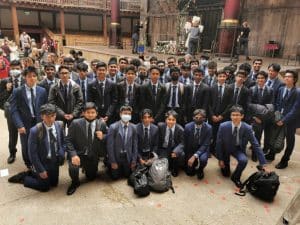 During the visit – QE’s first live theatre visit since before the pandemic – all of Year 11 experienced a radical take on Shakespeare’s tragic tale of two young Italian ‘star-crossed lovers’ that eschewed romance in favour of an unsparing focus on mental health.
During the visit – QE’s first live theatre visit since before the pandemic – all of Year 11 experienced a radical take on Shakespeare’s tragic tale of two young Italian ‘star-crossed lovers’ that eschewed romance in favour of an unsparing focus on mental health. Throughout the play, the boys stood in the theatre yard, or pit – the area which in Elizabethan times was the cheapest part of the theatre, with no seats provided. “This meant that sometimes the actors were moving between groups of students as they performed,” said Mr King.
Throughout the play, the boys stood in the theatre yard, or pit – the area which in Elizabethan times was the cheapest part of the theatre, with no seats provided. “This meant that sometimes the actors were moving between groups of students as they performed,” said Mr King. For his part, TimeOut’s Andrzej Lukowski’s said: “…I thought the billboard was an interesting idea in a mercurial show that often manages to be frustratingly dysfunctional and giddily fun at the exact same time….Essentially Ince’s desire to offer up two hours of hard-hitting social realism and two hours of wild escapist fantasy at the same time is not entirely reconcilable. Kitchen sink regietheatre* isn’t really a thing. But just because it doesn’t always ‘work’ doesn’t mean it’s not good: I loved the wild, irreverent roar of the ball [the scene in which Romeo first sees Juliet]; equally, I think Ince is on to something in choosing to earnestly highlight the number of references to suicide in the play – it seems quite reasonable to interpret the star-cross’d lovers as being depressed.”
For his part, TimeOut’s Andrzej Lukowski’s said: “…I thought the billboard was an interesting idea in a mercurial show that often manages to be frustratingly dysfunctional and giddily fun at the exact same time….Essentially Ince’s desire to offer up two hours of hard-hitting social realism and two hours of wild escapist fantasy at the same time is not entirely reconcilable. Kitchen sink regietheatre* isn’t really a thing. But just because it doesn’t always ‘work’ doesn’t mean it’s not good: I loved the wild, irreverent roar of the ball [the scene in which Romeo first sees Juliet]; equally, I think Ince is on to something in choosing to earnestly highlight the number of references to suicide in the play – it seems quite reasonable to interpret the star-cross’d lovers as being depressed.”

 For Year 10, the brief was to work in groups to design and construct ‘wearable architecture’, using 6mm paper tubes.
For Year 10, the brief was to work in groups to design and construct ‘wearable architecture’, using 6mm paper tubes.
 Head of English Robert Hyland said: “His joint-victory is fully deserved, and a credit to all the hard work he has put in. Adithya is in my English class, so when I saw his preliminary performance, I knew we were looking at something good; in the preliminary round in December, he was the only student to score full marks – and that in a top-set English class. However, I don’t think we recognised then how good his performance was!
Head of English Robert Hyland said: “His joint-victory is fully deserved, and a credit to all the hard work he has put in. Adithya is in my English class, so when I saw his preliminary performance, I knew we were looking at something good; in the preliminary round in December, he was the only student to score full marks – and that in a top-set English class. However, I don’t think we recognised then how good his performance was!
 With the help of QE’s resident Theatre Director, Gavin Molloy, members of the Year 8 drama club learned, staged and filmed dramatic monologues from home .
With the help of QE’s resident Theatre Director, Gavin Molloy, members of the Year 8 drama club learned, staged and filmed dramatic monologues from home .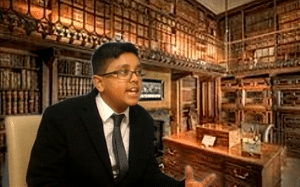 But more modern authors were certainly not forgotten: Aadam Aslan’s monologue was taken from Michael Morpurgo’s Private Peaceful. Keon Robert performed from The Class, by playwright and Game of Thrones actor Luke Barnes, while Karan Somani performed an excerpt from Roy Williams’ play about boxing and racism, Sucker Punch.
But more modern authors were certainly not forgotten: Aadam Aslan’s monologue was taken from Michael Morpurgo’s Private Peaceful. Keon Robert performed from The Class, by playwright and Game of Thrones actor Luke Barnes, while Karan Somani performed an excerpt from Roy Williams’ play about boxing and racism, Sucker Punch.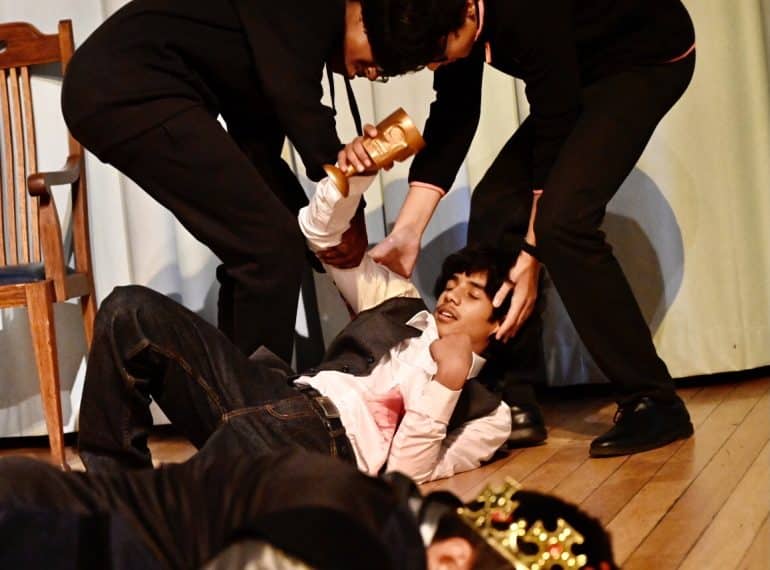
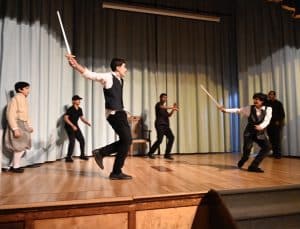 Year 9 Drama Club members performed an abridged version of Hamlet – and thanks to QE’s year group bubble system, their entire year were able to watch the performance in the Main School Hall.
Year 9 Drama Club members performed an abridged version of Hamlet – and thanks to QE’s year group bubble system, their entire year were able to watch the performance in the Main School Hall.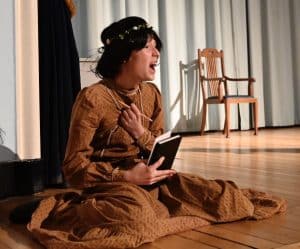 This year, it had originally been planned to live-stream performances, but in the end it was decided simply to have the boys perform live at the School, with Mr Bonham-Carter filming them.
This year, it had originally been planned to live-stream performances, but in the end it was decided simply to have the boys perform live at the School, with Mr Bonham-Carter filming them.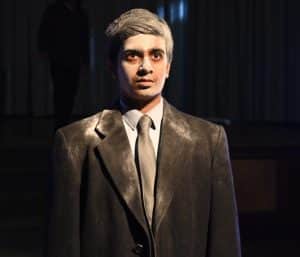 On the day of the performance, which replaced a Year 9 English lesson, Mr Bonham-Carter introduced the occasion, saying that Hamlet is a “play for us all”.
On the day of the performance, which replaced a Year 9 English lesson, Mr Bonham-Carter introduced the occasion, saying that Hamlet is a “play for us all”.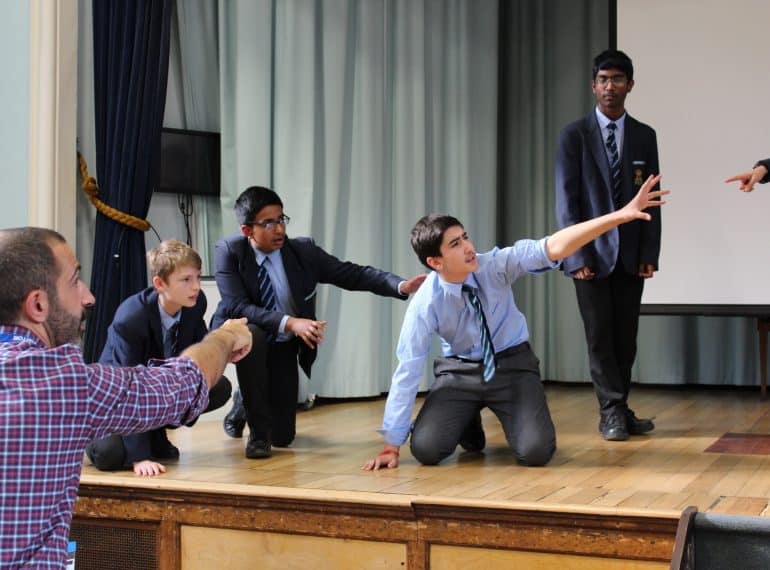
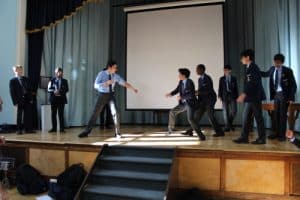 Rehearsals for the play, which opens with the ghost of the King of Denmark instructing his son, Hamlet, to avenge his murder, are now in full swing at the School. During the workshop, boys rehearsed the fight in the bloody final scene during which the young Danish Lord, Laertes, kills Hamlet in revenge for the deaths of his father and sister, only then to die himself, having been wounded with the same poisoned sword.
Rehearsals for the play, which opens with the ghost of the King of Denmark instructing his son, Hamlet, to avenge his murder, are now in full swing at the School. During the workshop, boys rehearsed the fight in the bloody final scene during which the young Danish Lord, Laertes, kills Hamlet in revenge for the deaths of his father and sister, only then to die himself, having been wounded with the same poisoned sword.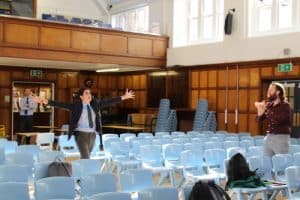 Leading the workshop were Gavin Molloy, of RM Drama (the company which provides drama direction for the School), and Brian Mullin, an Artistic Associate with the Coram Shakespeare Schools Foundation (the organisation which runs the festival).
Leading the workshop were Gavin Molloy, of RM Drama (the company which provides drama direction for the School), and Brian Mullin, an Artistic Associate with the Coram Shakespeare Schools Foundation (the organisation which runs the festival).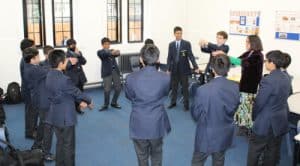 “We have a totally blank canvas and are working collaboratively with thoughts, ideas and production decisions. We share ideas, talk about productions we may have seen and also discuss how we will need to make a lot of character choices as we have only 30 minutes to re-tell probably the most famous story in literature, as we are working with a heavily cut-down script for the festival.
“We have a totally blank canvas and are working collaboratively with thoughts, ideas and production decisions. We share ideas, talk about productions we may have seen and also discuss how we will need to make a lot of character choices as we have only 30 minutes to re-tell probably the most famous story in literature, as we are working with a heavily cut-down script for the festival.